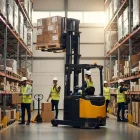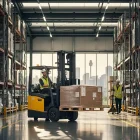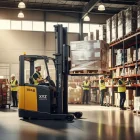Choosing the right forklift is crucial for operational efficiency and safety. But how do you find the right model for your industry?
The answer lies in selecting the right forklift dealer. A reputable dealer can provide expert advice and support, helping you navigate their diverse inventory.
In this guide, we’ll explore what to look for in a forklift dealer‘s inventory. We’ll discuss how to evaluate a dealer’s reputation, the importance of after-sales support, and the benefits of hands-on demonstrations.
We’ll also delve into the key features to consider when selecting a forklift. From lift capacity to fuel type, these features can significantly impact your operations.
Whether you’re a business owner in Sydney or a warehouse manager elsewhere, this guide will help you make an informed decision when purchasing a forklift.
Let’s dive in and find the right forklift model for your industry.
Understanding Your Industry’s Forklift Needs
Each industry has unique requirements when it comes to material handling equipment. Understanding these needs is the first step in selecting the right forklift model.
Consider the following factors to determine your needs:
- Load Capacity: Determine the maximum weight you’ll need to lift.
- Lift Height: Know how high your forklifts need to reach.
- Terrain Type: Identify whether you’ll be operating indoors or outdoors, on smooth or rough surfaces.
- Fuel Type: Decide between electric, diesel, or LPG, factoring in cost and environmental impact.
- Operational Space: Evaluate whether narrow aisle operation is necessary.
By clearly understanding these elements, you can better navigate a forklift dealer’s inventory. This ensures you select a model that meets your industry’s unique demands, ultimately optimising your operations.
Evaluating Forklift Dealer Reputation and Customer Service
A reputable forklift dealer can significantly enhance your buying experience. Start by researching the dealer’s history and reputation within the industry. Look for long-standing experience and positive feedback from past customers.
Customer service is equally crucial. A responsive, knowledgeable team can offer valuable insights and support.
Consider these points when evaluating a forklift dealer:
- Customer Testimonials: Review feedback on their service and reliability.
- Industry Affiliations: Check for memberships in professional organisations.
- Response Time: Ensure they have prompt and effective communication.
A dealer with a solid reputation and excellent customer service can offer more than just equipment. They provide peace of mind through reliable guidance and ongoing support. This relationship can be vital for maintaining efficient operations in your industry.
Diversity of Inventory: Types and Models of Forklifts
A diverse inventory is crucial when selecting a forklift dealer. It ensures you can find the right model tailored to your industry needs. A broad selection reflects a dealer’s capability to cater to varied requirements.
Different industries demand different forklift types and models. The right dealer will have these options available:
- Counterbalance Forklifts: Ideal for balanced weight and stability.
- Reach Trucks: Perfect for high shelving and narrow aisles.
- Pallet Jacks: Essential for simple material movement.
A forklift supplier with a variety of models demonstrates their understanding of the market’s range. They offer choices that can accommodate specialised tasks and unique operational demands. This selection allows businesses to effectively match equipment with specific industry functions, enhancing efficiency and productivity.
Key Features to Consider in Forklift Selection
When choosing a forklift, several key features must align with your industry needs. Start by identifying the essential operational characteristics for your tasks. Focusing on these features ensures efficiency and safety.
Critical features vary based on job requirements. Here are essential considerations:
- Lift Capacity: Ensure the forklift can handle your maximum load weight.
- Fuel Type: Electric, diesel, or gas options depending on environmental concerns and usage.
- Ergonomics: Operator comfort for long-term productivity.
Selecting the right features is integral to minimising downtime and increasing throughput. Proper alignment with your industrial demands helps achieve the highest operational standards.
Assessing the Quality of Forklifts in Dealer Inventory
Evaluating the quality of forklifts in a dealer’s inventory is vital. High-quality forklifts ensure reliability and longevity, reducing the risk of operational disruptions. Quality checks also minimise unforeseen maintenance costs.
Start by inspecting the condition of forklifts, whether new or used. Look for signs of wear and any indications of previous repairs. Additionally, request maintenance records for a thorough understanding of the machine’s history. Trustworthy dealers will willingly provide detailed documentation.
Such evaluations are essential in making an informed purchase. A robust inventory indicates the dealer’s commitment to offering top-tier equipment. Thorough assessment helps in securing forklifts that will meet your business needs reliably and effectively.
The Importance of After-Sales Support and Maintenance Services
After-sales support is crucial when purchasing forklifts. It ensures minimal downtime and swift resolutions to issues. Consistent maintenance services extend the lifespan of your equipment.
Look for dealers offering comprehensive after-sales support. Key services include:
- Scheduled maintenance programs
- Easy access to replacement parts
- Technical support and troubleshooting
Reliable support services enhance productivity and safeguard your investment. A strong partnership with your dealer guarantees timely assistance and optimal operational efficiency. Choosing a forklift dealer that prioritises customer support ensures your material handling operations run smoothly.
New vs. Used Forklifts: What a Dealer’s Inventory Should Offer
When selecting a forklift, consider both new and used options. Each has distinct benefits and potential drawbacks. A diverse dealer inventory should cater to both preferences.
New forklifts offer:
- Latest technology
- Comprehensive warranties
- Longer lifespan
Used forklifts, on the other hand, can provide cost savings and immediate availability. However, they may come with wear and tear issues. It’s essential to evaluate the condition and history of a used forklift carefully. Ensuring your dealer offers a balance of both new and used options helps you make an informed choice based on budget and needs.
Dealer Transparency and the Value of Demonstrations and Test Drives
Transparency is crucial when choosing a forklift dealer. A reputable forklift dealer Sydney should openly share details about the forklifts they offer. This includes information on the condition, history, and any repairs on used models.
Seeing a forklift in action adds confidence to your purchasing decision. A dealer who offers demonstrations and test drives shows their willingness to prove the quality and performance of their inventory. These opportunities allow you to experience handling, manoeuvrability, and operational ease firsthand. Engaging in these practical assessments is a vital step to ensure that a forklift meets your specific industrial requirements and comfort expectations.
Financing, Leasing, and Total Cost of Ownership Considerations
Understanding financing options can ease the financial burden of acquiring a forklift. Many dealers offer flexible plans to suit diverse budgets. It’s crucial to explore both financing and leasing options that a forklift dealer provides.
Considering the total cost of ownership ensures a complete financial understanding beyond the purchase price. Key aspects to evaluate include:
- Maintenance and repair costs over the forklift’s lifespan
- Fuel or energy expenses based on usage
- Resale value and potential depreciation
Knowing these factors helps you make informed financial decisions. Choose a dealer who offers transparent cost insights, aiding in selecting the most economical and efficient forklift solution.
The Role of Technology and Innovation in Forklifts
Technological advancements are transforming forklifts, offering enhanced efficiency and safety. Features like automation, telematics, and advanced ergonomic designs improve productivity and operator comfort. When evaluating a dealer’s inventory, prioritise models with innovative technologies that align with your industry needs, ensuring long-term operational benefits and staying competitive in the market.
Conclusion: Partnering with the Right Forklift Dealer
Choosing the right forklift dealer can significantly impact your business’s efficiency and productivity. A reputable dealer offers a diverse inventory tailored to meet industry-specific needs. They also provide unparalleled after-sales support, ensuring your operations run smoothly.
Consider factors like customer service, transparency, and technological advancements when selecting a forklift dealer Sydney. These elements ensure not only a good purchase but also a beneficial partnership. Prioritising a reliable forklift supplier can ultimately lead to more successful and cost-effective material handling operations, setting your business up for long-term success.




